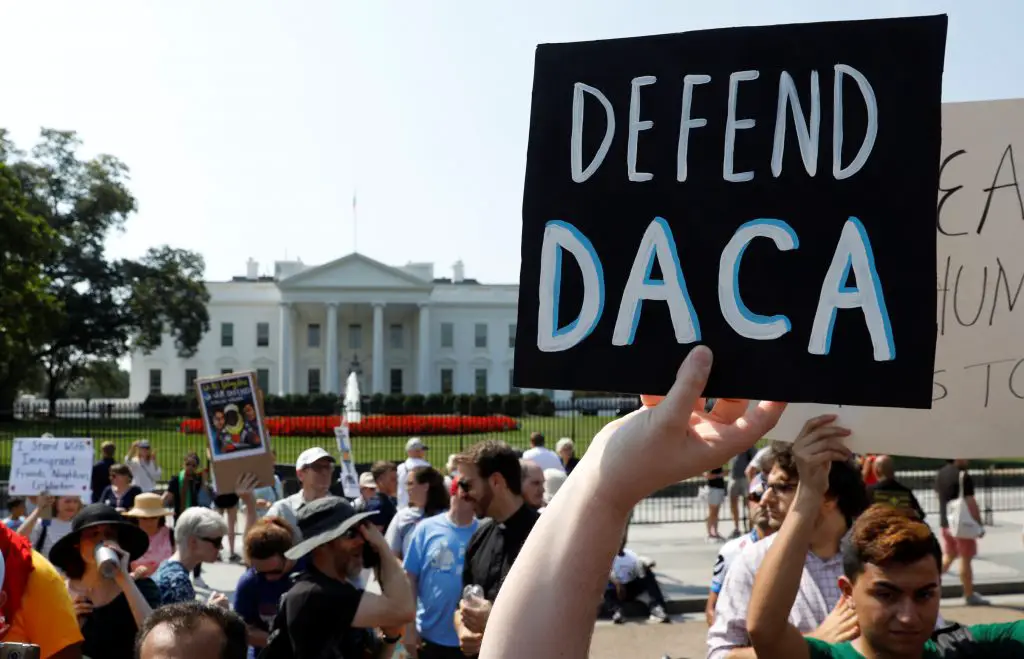In 2012, President Barack Obama issued an executive order known as the Dream Act, also known as the “Deferred Action for Childhood Arrivals” (DACA), which offered protection to children of undocumented immigrants who had no choice whether or not they came to the United States.
More specifically, DACA provided its members with the ability to legally work in the United States, which opened the door for hundreds of thousands of young people to enter into the workforce who would previously not have been able to do so.
However, due to the threat of legal action on the behalf of ten state attorney generals, an effort headed by Texas Attorney General Ken Paxton, President Donald Trump has set an ultimatum for the future of DACA.
In six months, the DACA program will be terminated unless new legislation is able to pass through congress that will allow for DACA, and many other issues that the current administration has with immigration, to be addressed and reformed. Despite this decision coming from the president himself, Attorney General Jeff Sessions was the one to announce the decision to the public.
Much of the rhetoric that Sessions, and White House Press Secretary Sarah Huckabee Sanders, have provided regarding the destruction of DACA has been aimed at the fact that the initial executive order that Barack Obama issued was “illegal,” and that DACA allowed an avenue for “illegal aliens” to steal jobs from the American people.
However, DACA does not give its members any advantages; in fact, the only promise that DACA provides is the opportunity for its members to work in the United States legally. While opposition of the program has expressed concern that DACA provides non-citizens with the opportunity to “steal” American jobs, raw numbers show that DACA members do not represent a significant percentage of the workforce in the United States.
Randy Capps, the director of research for the U.S. programs at Migration Policy Institute, told Politifact.com that DACA-eligible immigrants make up about a quarter of one percent of the 160-million-person labor force in the United States. Yet, if DACA is completely destroyed, and all 800,000 potential members of the program lose their right to work, it will still have a drastic impact on the United States’ economy.
A study performed in 2016 by the Center for American Progress found that DACA has been decidedly successful for all parties involved. Last year, 54 percent of respondents to their study reported that they purchased their first car, up from just 21 percent in 2015.
With a percentage of these large purchases going back to the state, DACA members are already having a positive impact on the economy. In the same study, it is reported that one of every five respondents work in the education or healthcare fields, providing public service to the communities that they live in.
The people who are being affected by the destruction of DACA, like many others, do not fit the backward rhetoric that both the president and members of his administration have spewed in reference to the immigrants who come from Central America.
Trump has unfairly grouped DACA members, who only wish to work legally in the United States, with those who actually commit crime. This could not be further from a productive comparison to make, as DACA members post a significantly lower crime rate in comparison to the average American citizen.

Trump’s entire campaign, and subsequent time as president, have been based upon his perceived business acumen. Constantly boasting of the growing economy since his election, which is entirely due to policies and trends that were taking place before he was even elected, Trump prides himself on being for the growth of the United States’ economy. Yet, the cancellation of DACA would result in a multitude of problems for those who employ DACA members.
According to a study performed by the Immigrant Legal Resource Center (ILRC), DACA’s destruction would result in the immediate unemployment of over 640,000 people in the United States. It is estimated by the ILRC that it would cost over $3.4 billion to terminate and eventually replace these workers, pinning the cost on the businesses that Trump has promised to protect.
On top of that, the next decade would see a $24.6 billion reduction in both Social Security and Medicare tax contributions made by DACA members and the businesses that employ them, which punishes American citizens who are not even involved in the destruction of DACA.
If rescinding DACA will not help the economy, what would be Trump’s motivation for getting rid of the program? Well, the main opposition of DACA came from eleven government officials across ten states. Attorney Generals from Texas, Louisiana, Alabama, Nebraska, Arkansas, South Carolina, Idaho (as well as the governor of the state), West Virginia, Kansas and Tennessee (who has since publicly supported the survival of the act) all threatened to challenge DACA in court if it was not rescinded.
Despite the overwhelming number of Attorney Generals that supported DACA in response, President Trump decided to give in to the ultimatum placed by the opposition of the program.
Coincidentally, each state that threatened to challenge DACA was also a state that Donald Trump won during the election, which leads many to believe that the decision to end DACA is not being made to help the American people, the economy or even to cut down on illegal immigration, but to secure the support of these states for Trump’s potential re-election in 2020.
Others have offered the point of view that Trump is attempting to save DACA by ensuring that its fate is decided outside of court. However, the six month deadline that he has proposed is a rather restrictive window for a piece of legislation that has struggled to gain permanence over a five-year period to this point.
If the president was truly concerned with ensuring that DACA survived, he might not have placed so much responsibility on the shoulders of Congress, who have not exactly been cooperative with the pieces of legislation that he has attempted to pass.
If one thing is for certain, the next six months are sure to be saturated with arguments for and against the destruction of DACA. By placing the onus on the Legislative Branch to find a solution, Trump believes that he has deflected the responsibility of facing this issue, as he has already proven by not announcing his decision himself, but by sending his Attorney General to do it for him.
The futures of thousands of young, ambitious people rest upon our Congress, but that does not mean that the American people are powerless. The worst thing that an American citizen can do at a time like this is remain silent. Engage in the dialogue surrounding this decision, speak to those who will be most affected and attempt to understand how difficult this time must be for them.
Regardless of your opinion of whether or not DACA should remain as a policy in the United States, contact your senators and make your voice heard before it is too late.
A full list of senators and their contact information can be found here.

















